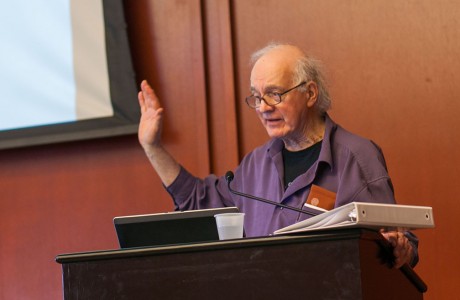
Jan Narveson, professor emeritus of philosophy, gave a lecture on Thursday, April 4, in the Fiesta Room. Naverson is a professor from the University of Waterloo in Ontario, Canada, and is one the guest speakers in the Professional Ethics Speakers Series held by the philosophy department.
“The series was designed to challenge students taking Philosophy 2359, Professional Ethics. We cover a number of issues, mostly reading essays on the topics. The issues are brought to life by experts in ethics defending their views,” said Steve Luper, chair of the philosophy department, via email.
Narveson’s lecture, titled “Professionals, Clients, and Rational Confidence,” covered the topic of intellectual property law and its growing prominence in modern culture. Throughout the lecture, Naverson explored important questions surrounding intellectual property law.
“We possess our ideas because they are ours, but by definition we are just in possession of these ideas. What if we say that we have a right to those ideas? All that means is that nobody can attack you if they were trying to take those ideas away,” Naveson said.
The philosophies of Locke, Pareto and many other philosophers were also discussed in application to how intellectual property law is implemented in a free society.
“Narveson did a fair job reviewing traditional defenses of property rights, such as the defense offered by John Locke, and showing how it is challenging to apply these to intellectual property,” Luper said.
The ideas presented in the lecture are meant to apply to intellectual mediums ranging from books and music to the ownership of coal and oil.
“It was interesting because I never really thought about intellectual property in this sense, but I did not feel convinced. It really made me think about the problem people have with patenting their stuff,” said first year Chris Sotar, who attended the lecture.
Much of Naverson’s lecture covered the difference between an abstract idea and a concrete idea. He made the point of stating that universal concepts could not be patented like other concepts.
“Just about anyone who plans to contribute to culture will also need to make a living. Ideally, they will be able to make their living by contributing to culture, but that presupposes that they will receive compensation for their contribution,” Luper said. “How and why they acquire those rights are issues of great significance, then, and that issue was addressed by the lecture.”
The next lecture in the Koch Professional Ethics Speaker Series, “Original Acquisition of Crime” by Timothy Hall, will take place at 4 p.m. on Thursday, April 25 in the Fiesta Room.






